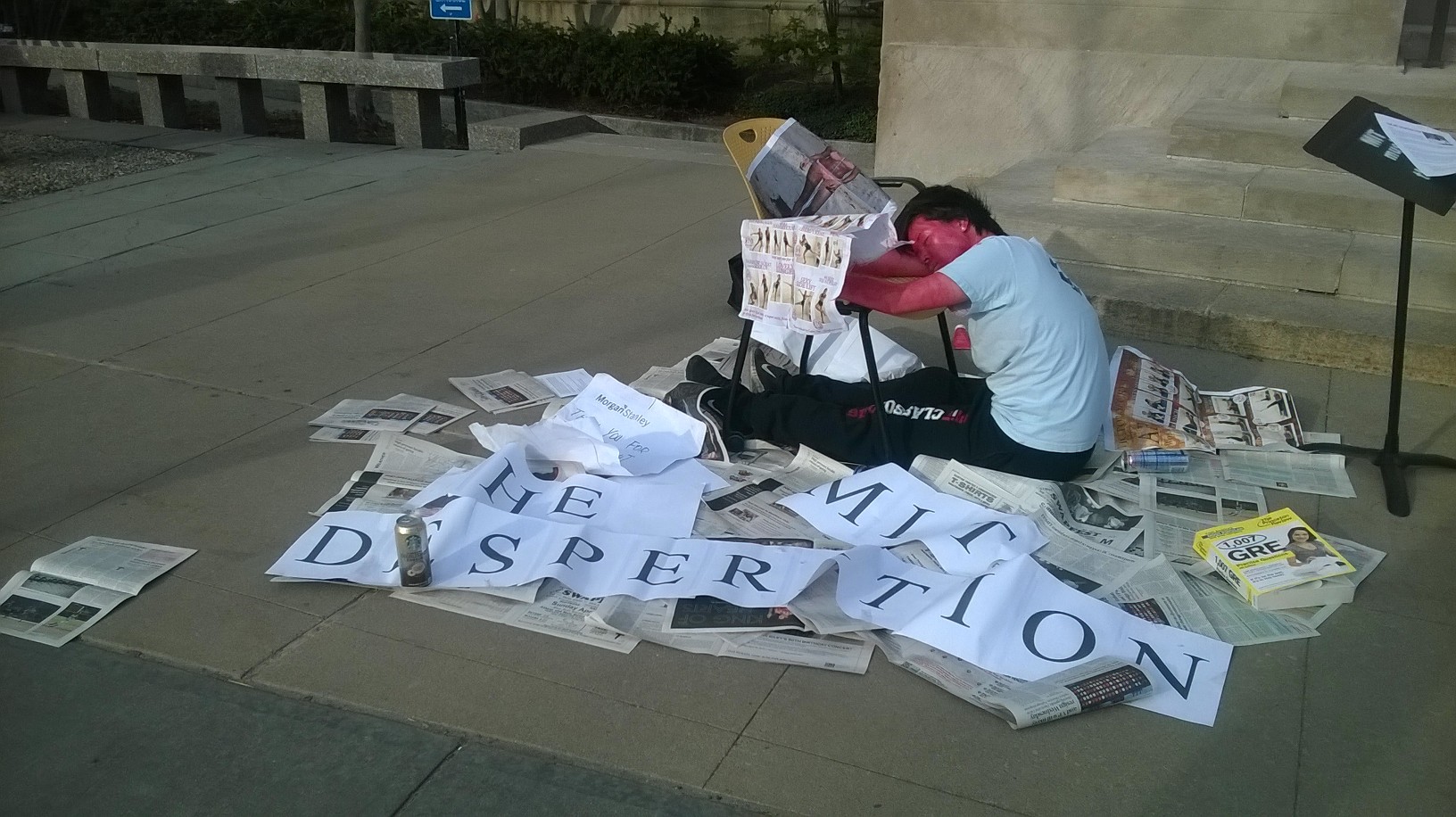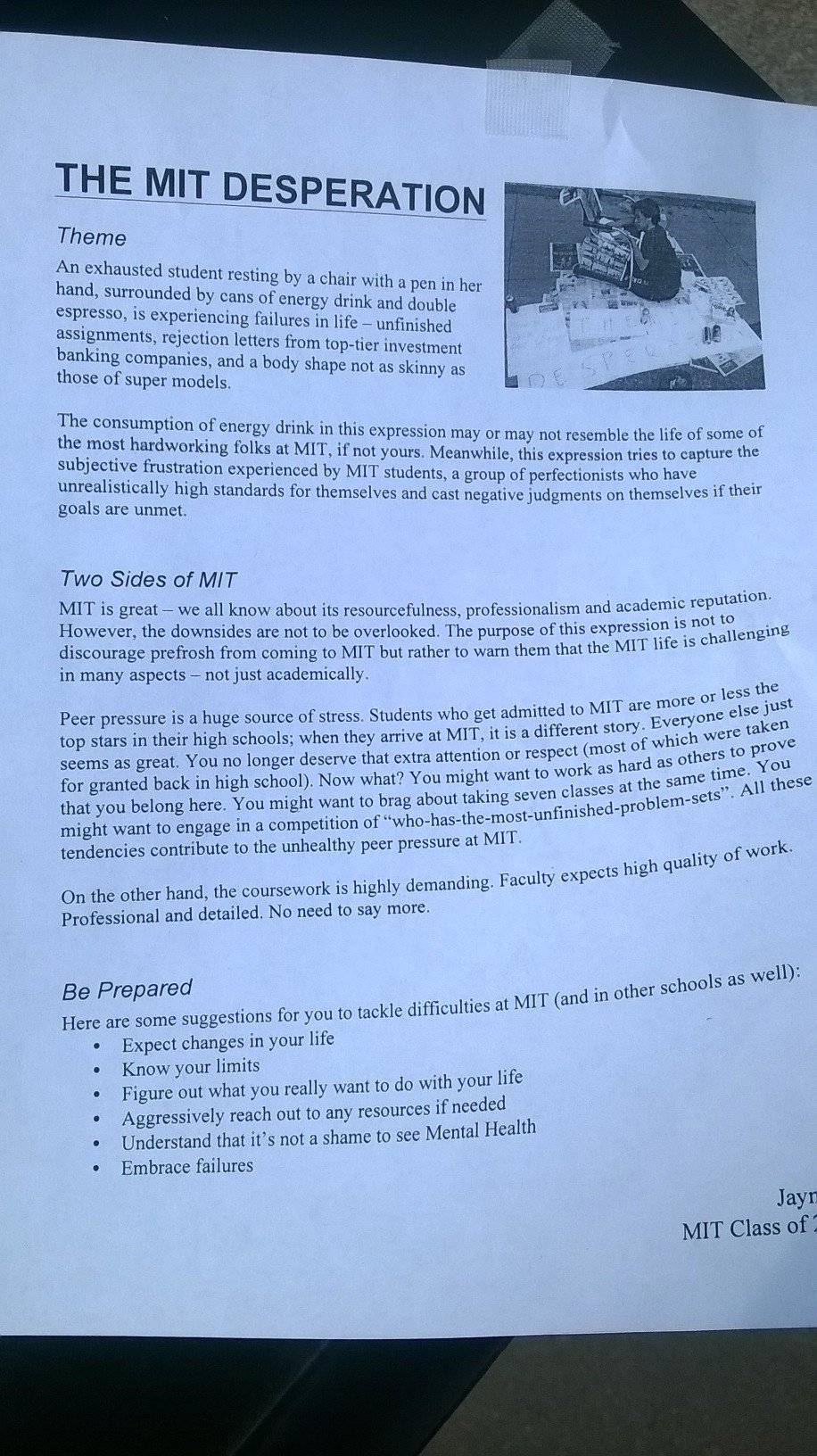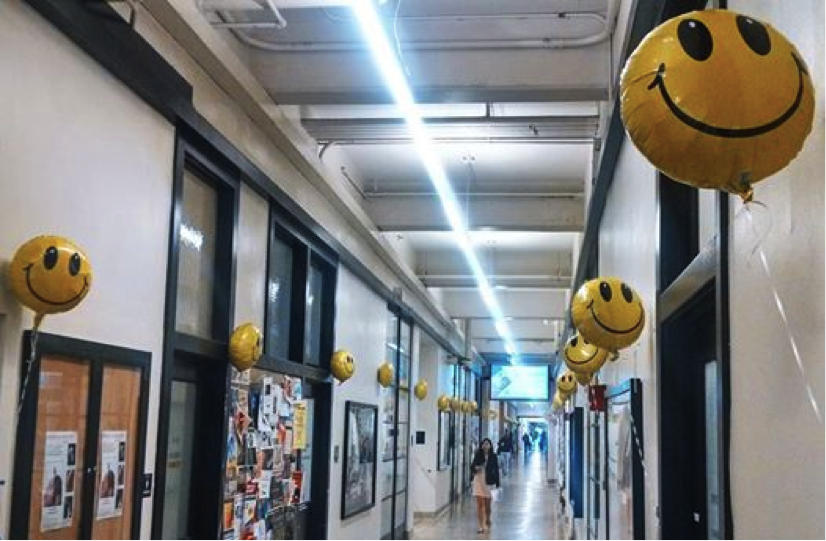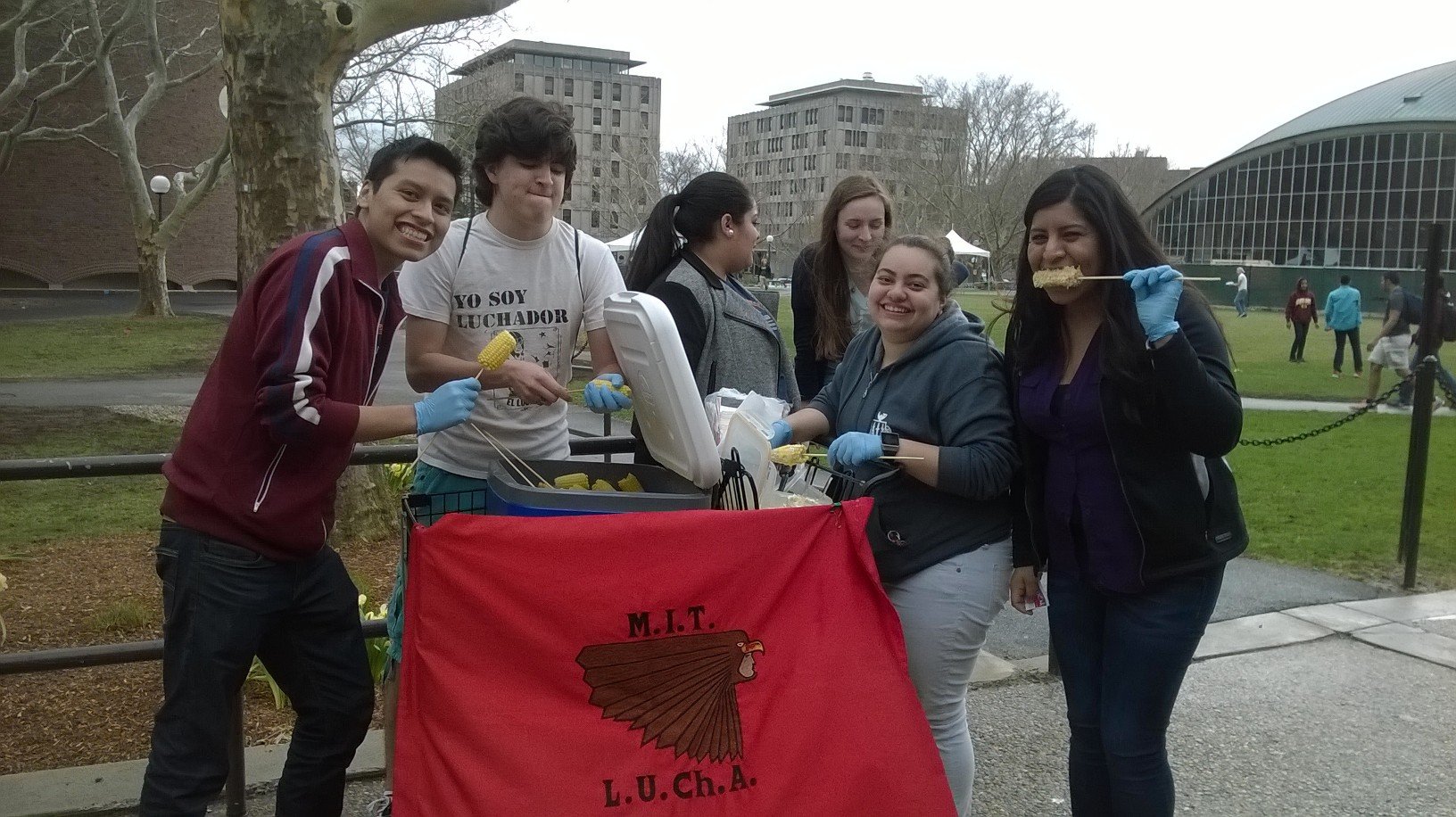Is CPW a lie? by Ana V. '15
I asked for opinions.
Campus preview weekend (CPW) at MIT is just what it sounds like—a time for high school seniors to visit campus to see if MIT is really the place they want to spend their college years.
The “weekend” itself starts on a Thursday, already an indication that it wildly exaggerates all that is good about life as a student. For the visiting senior, there is no stress—no exams, no due dates, no daunting expectation of quality work or results. The definition of the MIT experience, however, is not complete without the acknowledgment that it is a place where you will most likely learn your limits, if you haven’t already. Pun not intended, but I’m gonna roll with it.
Once your “I just got into MIT!” high school senior self arrives to campus, you’re given a booklet with pages and pages of things to do from 8am to 1am, all jam-packed into about seventy-five hours. Nerdy, silly, sporty, food-offering, you name it, that type of activity is probably included.
During my own preview weekend, I went to an event where pre-frosh and MIT students alike were sprawled on the floor building something with a pile of Legos that seemed to reach my knees. Knowing no one, I joined an upperclassman who invited me to help her make a duct tape hat. Others took turns playing Mozart’s Turkish March and the Mario theme song on the piano in the middle of the room. Nearby, an upperclassman excitedly scribbled equations and drawings on a chalkboard, colorfully explaining physics concepts that I could only scrape the surface of grasping.
I soaked it all in and confirmed that MIT was for me. I was showered with labs, classes, ideas, opportunities, and lifestyles, and it was nothing short of inspiring. Sure, I knew it was “hard”, but it was clear that people here enjoyed working with each other, and even if it was hard, at least there were always interesting things to do and think about. This is the spirit of preview weekend. It’s the spirit of MIT.
But is it really a preview of what MIT will be like? I don’t think most pre-frosh actually believe that it’s going to be as fun and happy as that weekend, but now I realize that the students who could speak to the darker defining times were probably in their rooms behind closed doors, waiting for the weekend to be over.
Back in 2011, my host’s neighbor was an aerospace engineering major. Given my interest in the major I was curious to hear about what life was like for her, so we knocked on her door. I noticed that the few questions I asked were answered with such bluntness and lack of passion. Was it dishonesty? It looked as though a tornado had gone through her room, and it seemed as though she was just waiting for us to leave. When we left, my host mentioned that she had a lot of work due that week, and happily changed the subject—“You should go on a lab tour where I work!” I thought it was silly for her neighbor to be so despondent and cooped up; she was living so many people’s dream! Was it I who lacked objectivity or was it she?
Sometimes pre-frosh ask how hard MIT actually is. But what does the sentence “MIT is hard” even mean? It means that come October of the first semester, midnight quasi-philosophical discussions about the future might become pset parties of frustration. Lists of things to do become as long as the infinite corridor, but unlike during CPW, they come with a price tag of your time and an expectation for them to be completed with excellence. At the core of what makes MIT challenging is learning the delicate balance between taking advantage of everything it has to offer and time management, all while doing a good job.
It’s possible and common to be so deep in piles of work that you will NOT be able to finish. (Example: I once made a 48-hour schedule of things I had to do and then realized I forgot to include time to sleep.) It means that even if you go to every recitation and lecture, you might still fail your exam, your interest in the material may vanish, and your mind will be so tired and full of the next thing you have to do and the last thing you haven’t done that it will likely become unable to think of happy things. You get an empty, sinking feeling in your stomach, and you wonder if you’ll be able to make it through the semester, let alone ever measure up to everyone else.
You won’t be alone. In a poll done in 2012, it was found that more than half of the student body surveyed believed they performed below average as compared to their peers. To bring back Lydia’s Meltdown post, “There’s this feeling that no matter how hard you work, you can always be better, and as long as you can be better, you’re not good enough.”
But you’ll probably feel alone at some point. My junior year I became so exhausted from juggling things that I would be unable to get out of bed for hours, unable to make an emotional connection even with myself. When one of my good friends asked me how I was doing a few days before finals, I struggled to express the despair I was feeling. We were outside, and streams of tears rolled down my face in public.
“I know I have no reason to be unhappy, but I just AM,” I told her. Her response helped me, “Remember when I went to your room to cry last semester and said the same thing to you? You probably didn’t understand it then, but now you do,” she said.
It was funny how our situations had reversed. I finally understood that day. It didn’t really make me feel any different, though, and she told me to go to see someone at mental health.
I didn’t. By the time a given class graduates, 35% of students will have gone to get mental health help. And that percentage doesn’t include those who, like me, lacked a “good reason.” Eventually the semester ended, I went home, slept like a normal person, re-connected with old friends and took life day by day. I started to feel like myself again. Sometimes you’re so busy and concerned with your work that you lose sight of the REALLY obvious, REALLY simple things in life, like “take care of yourself”. I look back on those days and feel tempted to laugh at myself. I shouldn’t have put myself through that.
Lately, people on campus have been putting more effort into de-stigmatizing depression and mental health issues that may come as a result of the high expectations and high stress environment.
Just yesterday, a student sat outside 77 Mass Ave as part of a public art display:

On the stand there was the following description:

The display was the work of Jayne C. ’16.
Last year, one of my peers who overcame depression came back to campus and started a happiness club. The club was responsible for purchasing and lining up smiley face balloons all along the infinite corridor as a way to express solidarity with regards to upcoming finals and encourage people to be proactive about their mental health.

During a senior speech dinner for people from the Latino Cultural Center last year, some seniors gave advice. Senior after senior discussed the importance of reaching out to other people when the semester gets tough. A few of them that I particularly looked up to talked about how they overcame depression while they were here, and how no one should never hesitate to make an appointment with someone at mental health if they felt unhappy for a long time. I had a hard time imagining these seniors being depressed. Their confidence and boldness made me realize that until people start realizing that many people feel unhappy during their time here, and that people should talk about it, the problem will persist.
One of them talked about the alchemist statue in front of the Student Center. “It’s a hollow statue of a person made from numbers and symbols sitting with their knees to their chest. Do you realize that that’s the only piece of art that represents a human on campus? A hollow human. Everything else is geometric or abstract!” she said. “Remember that we’re not robots, and that everything will be okay. Where’s the humanity in the art on campus? Remember that the humanity on campus is in you.”
When I ask fellow students whether or not preview weekend is a lie and if they should change it at all to be more representative of the experience, the responses vary. “It’s not a whole truth, it’s a necessary lie, it’s showing only the parts of MIT that happen once in while, but the best ones.” Most people seem fine with the idea that CPW is not a complete preview of MIT. One student said, “They should know that it’s not going to be this awesome all the time. How else will they know that we’re not just about studying, and that we know how to have fun?”
Kristine ’14, completely disagreed. “It’s not a lie at all!” She said. To her, CPW is a very good representation of what MIT is like. “Think about it: if you come here to do engineering or any other science it’s a very exciting environment. People say it’s a lot of work, but honestly, it’s their choice in the end.”
Perhaps she has a point. On the student side, every preview weekend has somewhat disgusted me. The morning of the last preview weekend, my groggy, fashionless self got on the shuttle to go to class, half-unpeeled banana in one hand and a project that had left me with about 2 hours of sleep in the other. Behind my seat raved the energetic voice of a pre-frosh, unmistakable. I didn’t have to look back at him to know that his eyes are gleaming with anticipation and wonder. “There are so many things to do, and everything’s so interesting! ” He explained to his host, looking at his CPW booklet. “No matter what you choose to do, it seems like you can’t go wrong.”
I blinked, noting the irony, memories of some late nights during my MIT experience that definitely went wrong flashing through my mind. I half-smirked in reaction to his perspective and at the idea that I was once just as excited and wide-eyed. Though I considered turning around and telling him he was wrong, I knew I didn’t need to. A different perspective leads to different valid points.
This CPW, I’ve been putting in more effort into meeting freshmen and telling them about life here. Even though it may not be an accurate preview of what life is like as a student, it sure gives you a reason for why it’s worth it to put so much work into something. Among other reasons, it’s for the chance to develop your strengths and discover all of your weaknesses.
What I believe drives the success behind MIT students in the real world is that to survive here, you become an expert at rolling up your sleeves and summoning your grit. Any kind of progress, scientific or not, is not easy and sometimes seems to be at a standstill no matter how much work you put into it. In the process, you learn about what your boundaries are mentally, physically, and emotionally. You will learn the exact number of hours of sleep you need. You will learn how to accept failure with a smile. That’s what MIT teaches you, and what preview weekend shows if you look hard enough.
After all, not every preview event goes perfectly as planned. Looking back at my CPW, when the upperclassman I had met realized that the duct tape hat fit neither of us, she was quick to amusedly say, “Oh that’s ok! If we make strips out of the brim, we can make it a purse instead!”
***
Now I’ll be off to enjoy my last CPW. Take a look at these elotes from LUChA! :D
